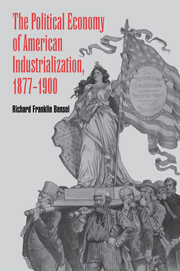Book contents
- Frontmatter
- Contents
- List of Tables
- List of Maps and Charts
- Preface
- Chapter 1 Introduction
- Chapter 2 Uneven Economic Development in the United States
- Chapter 3 Platform Demands, Party Competition, and Industrialization
- Chapter 4 Claims on Wealth and Electoral Coalitions
- Chapter 5 Political Construction of the National Market
- Chapter 6 Political Administration and Defense of the Gold Standard
- Chapter 7 Tariff Protection and the Republican Party
- Chapter 8 Conclusion
- Index
Chapter 5 - Political Construction of the National Market
Published online by Cambridge University Press: 27 March 2010
- Frontmatter
- Contents
- List of Tables
- List of Maps and Charts
- Preface
- Chapter 1 Introduction
- Chapter 2 Uneven Economic Development in the United States
- Chapter 3 Platform Demands, Party Competition, and Industrialization
- Chapter 4 Claims on Wealth and Electoral Coalitions
- Chapter 5 Political Construction of the National Market
- Chapter 6 Political Administration and Defense of the Gold Standard
- Chapter 7 Tariff Protection and the Republican Party
- Chapter 8 Conclusion
- Index
Summary
The emergence of the United States as an advanced industrial nation was driven by the rise of the modern business enterprise as the primary organizational form of mass production. Composed of many specialized operating divisions managed by a hierarchy of salaried executives, the modern business enterprise absorbed into its bureaucratic organization many of the allocating and coordinating functions previously performed by decentralized and often isolated markets in the preindustrial economy. Although the marketplace ultimately generated the price signals through which changes in demand were registered, in many sectors the modern business enterprise transformed arm's-length transactions between economic actors into institutional decisions concerning questions of supply, coordination of production, and distribution of goods. The engine behind the rise of the modern corporation was its ability to organize production of high volume, complex industrial goods more efficiently than smaller firms that had not similarly integrated resource-gathering and manufacturing tasks. For that reason, one of the major preconditions for the rise of the modern business enterprise was the existence of a large unregulated market; this market provided the raw materials and the consumer base through which to exploit the economies of scale for which the modern business enterprise was ideally suited.
Arising between 1840 and the First World War, the managerial, multidivisional organization of the modern corporation was almost predestined to appear first in the United States. Possessing a large unregulated national market – aside from Britain, probably the largest such market in the world – the United States also presented the precise organizational challenge which, given the state of industrial technology in the early nineteenth century, most encouraged progressive evolution toward managerial capitalism.
- Type
- Chapter
- Information
- The Political Economy of American Industrialization, 1877–1900 , pp. 289 - 354Publisher: Cambridge University PressPrint publication year: 2000
- 2
- Cited by



